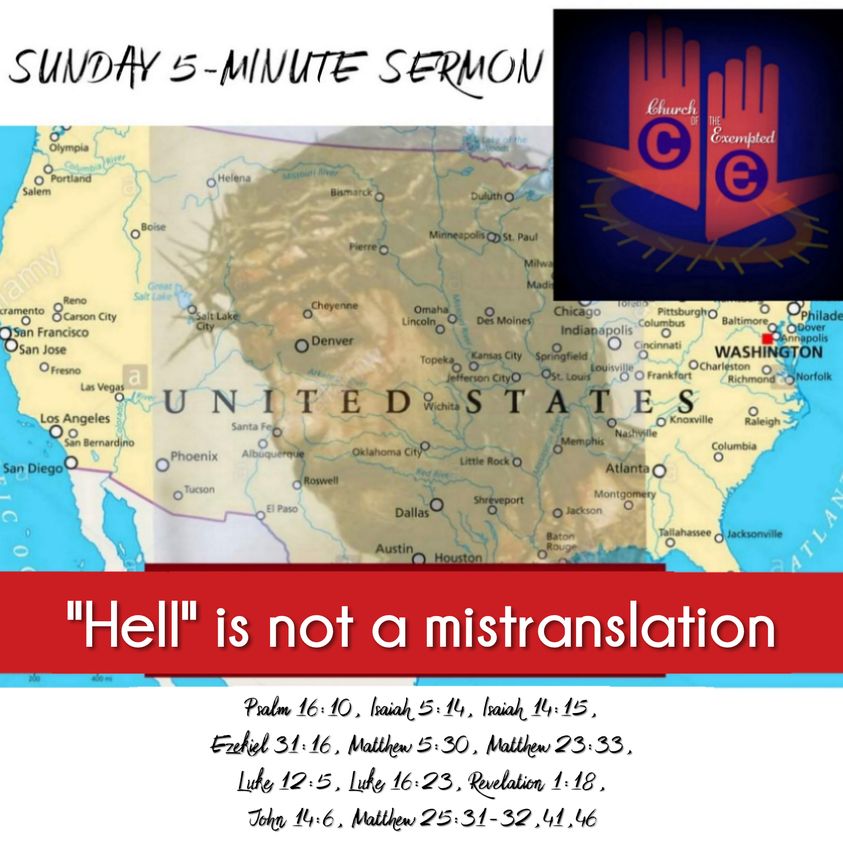Psalm 16:10, Isaiah 5:14, Isaiah 14:15,
Ezekiel 31:16, Matthew 5:30, Matthew 23:33,
Luke 12:5, Luke 16:23, Revelation 1:18,
John 14:6, Matthew 25:31-32,41,46
- Damonous
- March 27, 2022
- Go to video
A recent click-bait post making rounds asked to name something “not in the Bible”. My initial post was “Rapture” and “Trinity”, as those words do not exist anywhere in the Bible, and are poor descriptions of the topics, which tend to lead to false understandings. (Probably, topics of upcoming sermons.) But what really surprised me was someone having posted “Hell” as a thing they (incorrectly) believed to be not in the Bible. In trying to enlighten the person, they countered with even more self-conviction, claiming that apparently ALL the references in the Bible were mistranslations of a physical sacrificial fire pit outside of Jerusalem, named Gehenna in the Greek text. It should be said that there are also people who believe that the proper translation of “Hell” in the Old Testament should be “Sheol” (which, regardless, has the same meaning). These type of arguments also ignore the fact that some words are homonyms, and can have more than one meaning. But, just because I personally like that the word “bark” refers to the crusty covering of a tree, should I become confused about what is meant when someone says, “Do you hear that dog barking?”
The decision of the translators of the King James Version of the Bible were correct in using one word to refer to the same concept, even though the actual name of “Hell” is different in the Greek of the New Testament vs the Hebrew of the Old.
While a few passages of Scripture represent “Hell” figuratively, the majority of times “Hell” clearly means to describe an actual place of eternal torment and punishment for the unbelieving and unrepentant. In the Old Testament, “Hell” (“Sheol”) is referenced 30+ times. To make the point that “Hell” is NOT a friendly or temporary place, I’m going to SUBSTITUTE the word “Hell” with “SMITTY’S” in the following verses, and you tell me if the exact translation of the word itself has any bearing on the intent and understanding…
Psalm 16:10 KJV
For thou wilt not leave my soul in <SMITTY’S>; neither wilt thou suffer thine Holy One to see corruption.
Isaiah 5:14 KJV
Therefore <SMITTY’S> hath enlarged herself, and opened her mouth without measure: and their glory, and their multitude, and their pomp, and he that rejoiceth, shall descend into it.
Isaiah 14:15 KJV
Yet thou shalt be brought down to <SMITTY’S>, to the sides of the pit.
Ezekiel 31:16 KJV
I made the nations to shake at the sound of his fall, when I cast him down to <SMITTY’S> with them that descend into the pit…
Let’s continue this method with the 160+ references in the New Testament; again replacing the word “Hell” (“Gehenna”, in the Greek) with <SMITTY’S>, to prove that the warning is against an eternal punishment in a very bad place (regardless of its name)…
Matthew 5:30 KJV
And if thy right hand offend thee, cut it off, and cast it from thee: for it is profitable for thee that one of thy members should perish, and not that thy whole body should be cast into <SMITTY’S>.
Matthew 23:33 KJV
Ye serpents, ye generation of vipers, how can ye escape the damnation of <SMITTY’S>?
Luke 12:5 KJV
But I will forewarn you whom ye shall fear: Fear him, which after he hath killed hath power to cast into <SMITTY’S>; yea, I say unto you, Fear him.
Luke 16:23 KJV
And in <SMITTY’S> he lift up his eyes, being in torments, and seeth Abraham afar off, and Lazarus in his bosom.
Revelation 1:18 KJV
I am he that liveth, and was dead; and, behold, I am alive for evermore, Amen; and have the keys of <SMITTY’S> and of death.
…So, as you can see: It doesn’t matter what NAME you give to “Hell”. There IS a place of wrath and torment, and the only way to escape it is to repent from our former ways and believe that Jesus is Lord, who died on the Cross for the forgiveness of our sins. As Jesus said so definitively in John 14:6: “I am the way, the truth, and the life: no man cometh unto the Father, but by me.”
In Matthew 25, Jesus at length confirms the joy and salvation of the righteous, but also the damnation of the foolish: Matthew 25:31-32,41,46 KJV
“When the Son of man shall come in his glory, and all the holy angels with him, then shall he sit upon the throne of his glory: [32] And he shall set the sheep on his right hand, but the goats on the left. [41] Then shall he say also unto them on the left hand, Depart from me, ye cursed, into everlasting fire, prepared for the devil and his angels: [46] And these shall go away into everlasting punishment: but the righteous into life eternal.”
Make no mistake: There’s no “mistranslation” of one of the most solid, underlying concepts of the Bible. There is a heaven, but there is also a Hell. There is great reward for the repentant, but great damnation for the prideful. Don’t let anyone mislead you with legalistic theatrics about wordplay, because you are unwilling to do a simple “search” in a digital Bible, or clumsily pick of a few random pages in a physical Bible and likely stumble upon one of the MANY solid Scriptural references to Hell.
Some people WANT to diminish the concept of Hell, because then it validates their every decision, good and bad. Removing the concept of Hell, gives them the ‘comfort’ that they can be their own gods, and not follow the One True God’s commands, or even take time to really reflect upon His atonement for our sins.
Let that not be you, my friends. May the Lord bless you and keep you. May you be willing to humble yourselves before Him. In Jesus’ name, amen.

